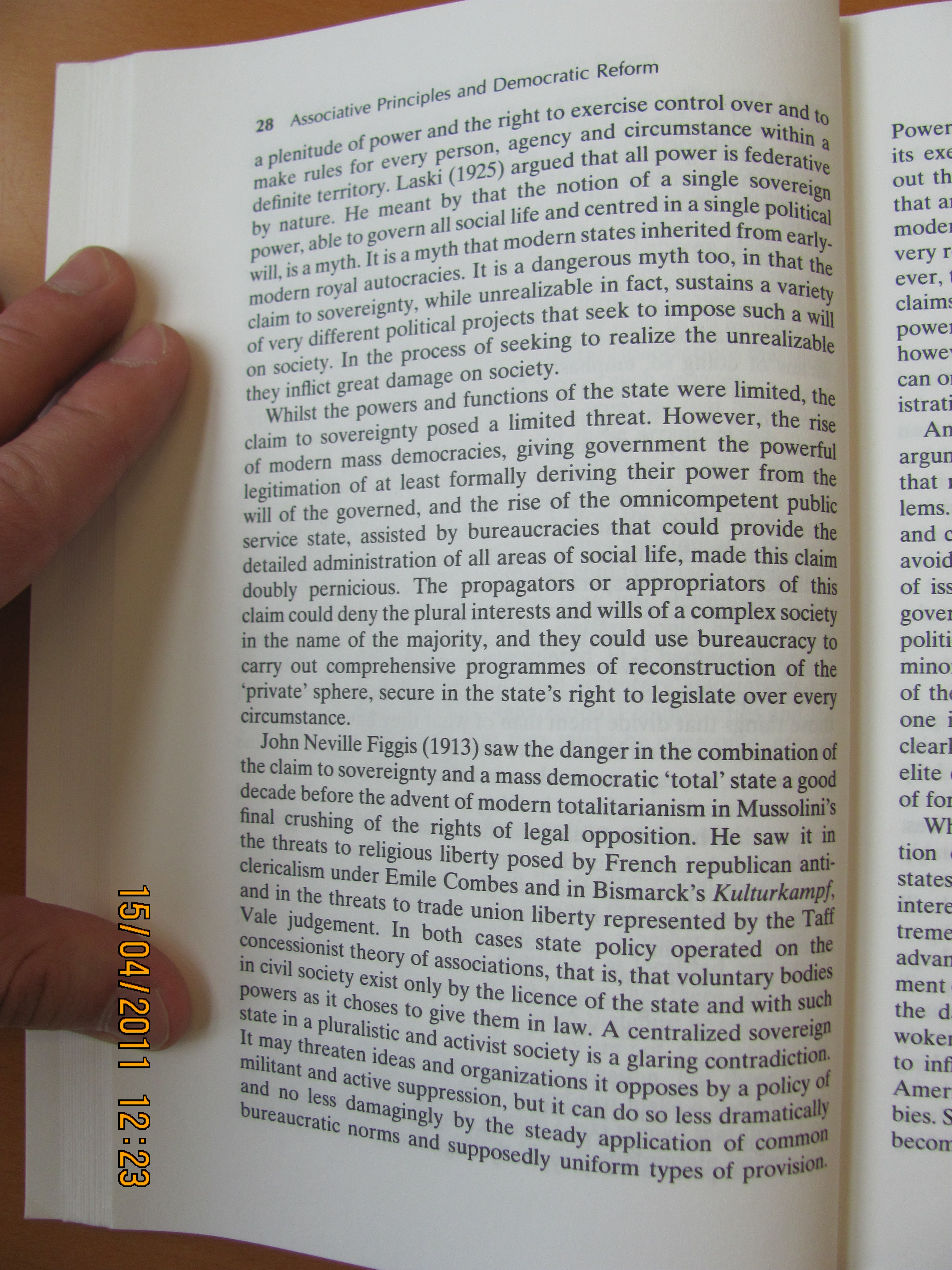83038 IMG#16

28 Associative Principles and Democratic Reform
a pleni tude of power and the right to exercise control over and to I make rules for every person, agency and circumstance within a I definite tern tory. Laski (1925) argued that all power is federative 1 by naturę. He meant by that the notion of a single sovereign I power, able to govem all social life and centred in a single political I will, is a myth. It is a myth that modem States inherited from early- I modem royal autocracies. It is a dangerous myth too, in that the I claim to sovereignty, while unrealizable in fact, sustains a variety I of very different political projects that seek to impose such a will I on society. In the process of seeking to realize the unrealizable I they inflict great damage on society.
Whilst the powers and functions of the State were limited, the \ claim to sovereignty posed a limited threat. However, the rise I of modem mass democracies, giving govemment the powerful I legitimation of at least formally deriving their power from the 1 will of the govemed, and the rise of the omnicompetent public 1 service State, assisted by bureaucracies that could provide the f detailed administration of all areas of social life, madę this claim doubly pemicious. The propagators or appropriators of this | claim could deny the plural interests and wills of a complex society in the name of the majority, and they could use bureaucracy to carry out comprehensive programmes of reconstruction of the ‘private’ sphere, secure in the State’s right to legislate over eveiy i circumstance.
John Neville Figgis (1913) saw the danger in the combinationof the claim to sovereignty and a mass democratic ‘total’ State a good f decade before the advent of modem totalitarianism in Mussolini’s I finał crushing of the rights of legał opposition. He saw it in the threats to religious liberty posed by French republican anti* clericalism under Emile Combes and in Bismarck’s Kulturkampf, I and in the threats to trade union liberty represented by the Taff Vale judgement. In both cases State policy operated on the concessionist theory of associations, that is, that voluntary bodies J in civil society exist only by the licence of the State and with such powers as it choses to give them in law. A centralized sovereign j State in a pluralistic and activist society is a glaring contradiction. I It may threaten ideas and organizations it opposes by a policy of ^ militant and active suppression, but it can do so less dramatically f and no less damagingly by the steady application of commofl I bureaucratic norms and supposedly uniform types of provisiofl
Power its exd out thl that al modei very rl ever, I claim? powefl howefl can ofl istrati An argur that i lems. and c avoid of iss govei politi mino of th< one i elear! elite i of foi W1 tion < States intere treme advar ment the d wokei to inf Amer bies. S becon
Wyszukiwarka
Podobne podstrony:
IMG#16 28 Associative Principles and Democratic Reform a pleni tude of power and the right to exerci
IMG#10 22 Associative Principles and Democratic Reform public power and of the devolved associationa
IMG#18 30 Associative Principles and Democratic Reform gain the upper hand and impose their view on
16826 IMG#30 42 Associative Principles and Democrau^. must be permissive and gradual, not prescripti
IMG#14 26 Associative Principles and Democratic Reform democratic naturę of the ‘primary association
IMG#20 32 Associative Principles and Democratic Reform Laski in ‘The Problem of Administrative Areas
IMG#08 20 Associative Principles and Democratic Reform yoluntary associations in order to do so. Ass
82043 IMG#22 34 Associaftve Principles and Democratic Reform contradśction with centralized, bureauc
więcej podobnych podstron